Related Research Articles
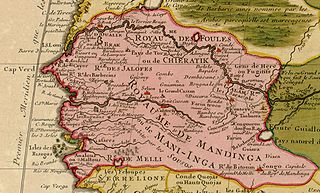
The history of Senegal is commonly divided into a number of periods, encompassing the prehistoric era, the precolonial period, colonialism, and the contemporary era.
The Principality of Bethio was a small monarchy located for centuries along the lower Senegal River valley, on the border between modern Mauritania and Senegal, in the northeast of Biffeche. In the 18th century it was also called the "Royaume d'Oral." Its capital was at Poum, then moved to N'Dombo, and finally moved to Ross, Senegal in the 19th century. The original, fertile farmlands of Bethio are in a region just east of the Djoudj National Bird Sanctuary.
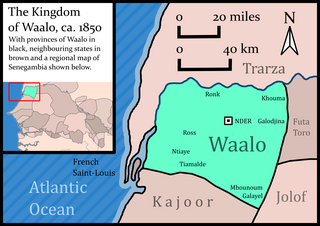
Waalo was a kingdom on the lower Senegal River in West Africa, in what is now Senegal and Mauritania. It included parts of the valley proper and areas north and south, extending to the Atlantic Ocean. To the north were Moorish emirates; to the south was the kingdom of Cayor; to the east was Jolof.
The Lebu are a subgroup of Wolof in Senegal, West Africa, living on the peninsula of Cap-Vert, site of Dakar. The Lebu are primarily a fishing community, but they have a substantial business in construction supplies and real estate. They speak Lebu Wolof, which is closely related to Wolof proper but is not intelligible with it.
The Senegambia is, in the narrow sense, a historical name for a geographical region in West Africa, which lies between the Senegal River in the north and the Gambia River in the south. However, there are also text sources which state that Senegambia is understood in a broader sense and equated with the term the Western region. This refers to the coastal areas between Senegal and Sierra Leone, where the inland border in the east was not further defined.

Boubacar Boris Diop is a Senegalese novelist, journalist and screenwriter. His best known work, Murambi, le livre des ossements, is the fictional account of a notorious massacre during the Rwandan genocide of 1994. He is also the founder of Sol, an independent newspaper in Senegal, and the author of many books, political works, plays and screenplays. Doomi Golo (2003) is one of the only novels ever written in Wolof; it deals with the life of a Senegalese Wolof family. The book was published by Papyrus Afrique, Dakar.

Cheikh Anta Diop was a Senegalese historian, anthropologist, physicist, and politician who studied the human race's origins and pre-colonial African culture. Diop's work is considered foundational to the theory of Afrocentricity, though he himself never described himself as an Afrocentrist. The questions he posed about cultural bias in scientific research contributed greatly to the postcolonial turn in the study of African civilizations.

Cheikh Anta Diop University, also known as the Cheikh Anta Diop University of Dakar, is a university in Dakar, Senegal. It is named after the Senegalese physicist, historian and anthropologist Cheikh Anta Diop and has an enrollment of over 60,000.
Brak was the title of the kings of the kingdoms of Waalo and Biffeche on the Senegal River in Senegal and Mauritania in West Africa until the 19th century.
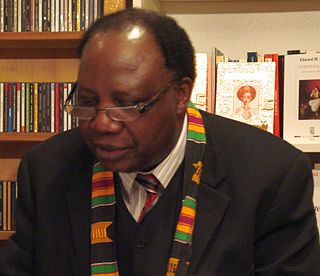
Théophile Obenga is professor emeritus in the Africana Studies Center at San Francisco State University. He is a politically active proponent of Pan-Africanism. Obenga is an Egyptologist, linguist, and historian.

The Kingdom of Sine was a post-classical Serer kingdom along the north bank of the Saloum River delta in modern Senegal. The inhabitants are called Siin-Siin or Sine-Sine.
Trade unionism is a powerful force in the politics, economy, and culture of Senegal, and was one of the earliest trades union movements to form in Francophone West Africa.
The French conquest of Senegal started in 1659 with the establishment of Saint-Louis, Senegal, followed by the French capture of the island of Gorée from the Dutch in 1677, but would only become a full-scale campaign in the 19th century.
This is a list of states headed by the Serer Lamanes. The Lamanes have a historical, economic and religious significance in Serer countries. The following pre-colonial kingdoms and new states (post-independence) were for a long time dominated by the Serer Lamanic class :

Teigne was a Serer title for the monarchs of the pre-colonial Kingdom of Baol, now part of present-day Senegal. The Kingdoms of Baol and Cayor became intricately linked especially post 1549 when the Faal family came to into prominence, and it was the same family that eventually ruled both Kingdoms with the exception of few interruptions, notably Lat Joor Ngoneh Latir Jobe who was of a different patrilineage.

Lingeer Fatim Beye Joos Fadiou was a 14th-century Serer princess and queen (Lingeer) from the Kingdom of Sine. She is the matriarch and early ancestor of the Joos Maternal Dynasty of Waalo. She is usually regarded by some sources as the founder of the Joos Maternal Dynasty. The pre-colonial Kingdoms of Sine and Waalo now lies within present-day Senegal. Her surname is Beye (English-Gambia) or Bèye (French-Senegal). Joos Fadiou is her maternal clan. In Serer, "Fa-tim" means "the maternal clan of..."

The Joos Maternal Dynasty was a Serer maternal dynasty which originated from the Serer pre-colonial Kingdom of Sine in the 14th century and spread to the Wolof Kingdom of Waalo. The matriarch or founder of this maternal dynasty was Lingeer Fatim Beye, a princess and queen originally from the Kingdom of Sine. In Waalo, it was founded by the princess Lingeer Ndoye Demba of Sine. Lingeer Ndoye Demba was the maternal granddaughter of Lingeer Fatim Beye. They both came from the Serer ethnic group. The pre-colonial Kingdoms of Sine and Waalo now forming a part of modern-day Senegal maintained good relations with other pre-colonial kingdoms.
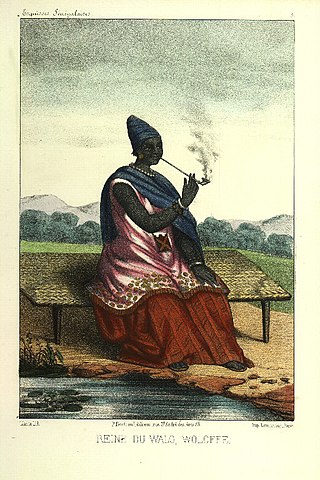
Ndaté Yalla Mbodj, also known as Ndateh Yalla Mbooj, was the last Lingeer (Queen) of Waalo, a Jolof kingdom located in what is now northwest Senegal. During her reign, she fought against French colonization and Moorish invasion of her kingdom. Ndaté Yalla and her sister Ndjeumbeut Mbodj were two of the most powerful women of 19th century Senegalese dynastic history.
Amadou Bâ, also known as Doudou Ba, was a Senegalese politician, adjunct to the mayor of Dakar and minister.
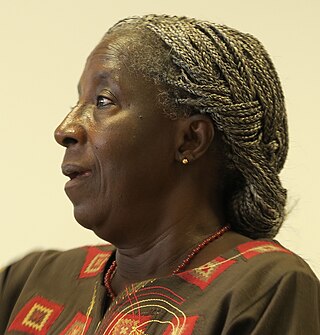
Fatou Sow is a Senegalese feminist sociologist specialising in sociology of gender.
References
- ↑ "Distinguished Africanist Award". africanstudies.org. African Studies Association. 2022. Retrieved 27 October 2022.
- ↑ Klein, Martin (Nov 1, 2016). "AHA Activities Boubakar Barry, Historian of Senegambia, Selected as 2016 Honorary Foreign Member". historians.org. American Historical Association. Retrieved 27 October 2022.
- ↑ "Barry, Boubacar". Worldcat.org. OCLC . Retrieved 5 October 2024.